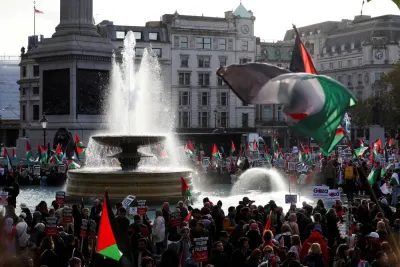
Protesters wave Serbian flags as they attend a rally of “ProGlas”, a Serbian pro-democracy movement, to protest against alleged electoral fraud in Belgrade on Saturday. (AFP)
Thousands of protesters gathered on Saturday in Belgrade in the biggest of a series of rallies against alleged electoral fraud.
It marked the 13th consecutive demonstration since the December 17 parliamentary and local elections in which Serbian President Aleksandar Vucic’s party said it secured a commanding victory.
Opposition groups contested the results and protesters have erected sporadic roadblocks in Belgrade, with more than 30 arrested after an attempt to storm city hall last week.
“Students, 18 and 20 years old, are being charged for overthrowing the constitutional order, they are in house arrest — is that a sign of fair elections?” asked one of the student leaders, Emilija Milenkovic.
“We only want our voice to be heard at least in the polling stations,” she added, thanking her colleagues who endured the 24-hour street blockade.
The main opposition coalition “Serbia Against Violence” as well as other groups and initiatives alleged many irregularities, including that ethnic-Serb voters from neighbouring Bosnia had been allowed to cast ballots illegally in the capital.
International observers also reported irregularities while several Western nations voiced concern over the electoral process.
Satuday’s protests were a continuation of the first 24-hour blockade of streets in central Belgrade, mainly by students organised within the Borba (“Fight”) movement, who are calling for the results to be annulled and new votes held.
The organisers called for facilitation by the European Union as well as establishing an independent investigation committee for the alleged irregularities, setting fair conditions for elections and organising new polls in six months.
University professor Filip Ejdus said that the students “these days are holding a public class of civic responsibility and courage”.
“We do not agree on stolen election, arrested students and police torture,” he added.
The appearance on stage of Serbian opposition leader Marinika Tepic — who had been on hunger strike since December 18 in protest — enlivened the crowd the most.
After being helped to get on the stage to address the demonstrators, Tepic went to the hospital and announced she was ending her hunger strike.
The protest continued with demonstrators marching towards the Constitutional Court.
“This is what we wanted, to bring back hope,” said university professor Tamara Dzamonja Ignjatovic.
The location at Terazije fountain symbolically connects the gathering with the so-called “Plush revolution” from March 1991 — one of the first major demonstrations against former Serbian strongman Slobodan Milosevic.
Thousands of students marched in central Belgrade in response to the violent dispersion of earlier protests that included tanks on the streets.
The “Plush revolution” lasted four consecutive days with all demands being met, among them the resignation of the interior minister and a change in the leadership of public broadcaster RTS, a demand that is also relevant today.
Vucic’s right-wing Serbian Progressive Party (SNS), in power since 2012, on December 17 won roughly 46% of votes in the parliamentary elections, while the leading opposition coalition secured 23.5 percent, the official results show.
The protests culminated on Sunday, when demonstrators tried to storm Belgrade city hall using flagpoles and rocks. Police pushed them back with pepper spray and arrested more than 30 of them.
It marked the 13th consecutive demonstration since the December 17 parliamentary and local elections in which Serbian President Aleksandar Vucic’s party said it secured a commanding victory.
Opposition groups contested the results and protesters have erected sporadic roadblocks in Belgrade, with more than 30 arrested after an attempt to storm city hall last week.
“Students, 18 and 20 years old, are being charged for overthrowing the constitutional order, they are in house arrest — is that a sign of fair elections?” asked one of the student leaders, Emilija Milenkovic.
“We only want our voice to be heard at least in the polling stations,” she added, thanking her colleagues who endured the 24-hour street blockade.
The main opposition coalition “Serbia Against Violence” as well as other groups and initiatives alleged many irregularities, including that ethnic-Serb voters from neighbouring Bosnia had been allowed to cast ballots illegally in the capital.
International observers also reported irregularities while several Western nations voiced concern over the electoral process.
Satuday’s protests were a continuation of the first 24-hour blockade of streets in central Belgrade, mainly by students organised within the Borba (“Fight”) movement, who are calling for the results to be annulled and new votes held.
The organisers called for facilitation by the European Union as well as establishing an independent investigation committee for the alleged irregularities, setting fair conditions for elections and organising new polls in six months.
University professor Filip Ejdus said that the students “these days are holding a public class of civic responsibility and courage”.
“We do not agree on stolen election, arrested students and police torture,” he added.
The appearance on stage of Serbian opposition leader Marinika Tepic — who had been on hunger strike since December 18 in protest — enlivened the crowd the most.
After being helped to get on the stage to address the demonstrators, Tepic went to the hospital and announced she was ending her hunger strike.
The protest continued with demonstrators marching towards the Constitutional Court.
“This is what we wanted, to bring back hope,” said university professor Tamara Dzamonja Ignjatovic.
The location at Terazije fountain symbolically connects the gathering with the so-called “Plush revolution” from March 1991 — one of the first major demonstrations against former Serbian strongman Slobodan Milosevic.
Thousands of students marched in central Belgrade in response to the violent dispersion of earlier protests that included tanks on the streets.
The “Plush revolution” lasted four consecutive days with all demands being met, among them the resignation of the interior minister and a change in the leadership of public broadcaster RTS, a demand that is also relevant today.
Vucic’s right-wing Serbian Progressive Party (SNS), in power since 2012, on December 17 won roughly 46% of votes in the parliamentary elections, while the leading opposition coalition secured 23.5 percent, the official results show.
The protests culminated on Sunday, when demonstrators tried to storm Belgrade city hall using flagpoles and rocks. Police pushed them back with pepper spray and arrested more than 30 of them.
Source link
 Kokani.me Kokani.me
Kokani.me Kokani.me



